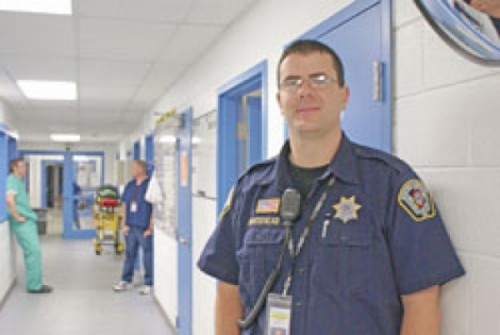News | Jailhouse Blues: Overworked and underpaid prison guards struggle to stay fresh on a dirty job.
By Eric S. Peterson @ericspeterson“People on the outside really don’t know what it means,” Whitehead says. “You get feces and urine thrown at you; you get sworn at; you get assaulted.” Like many new officers at the prison, he’s leaving for a better paying job—with the West Jordan police force. “It’s a $4 or $5 raise starting out,” he says of his new starting salary. Whitehead has worked at the Draper prison for two years. “I like it here,” he says. “If they would pay more, I really would stay, but right now I’m barely getting by.”
Low pay is forcing state corrections officers to seek higher-paying county and municipal jobs at a time when Utah’s prisons are drastically overcrowded and short more than 100 officers throughout the system. The shortage is forcing mandatory overtime and even requiring prison office workers to fill in as guards.
Whitehead’s complaint is echoed by many new officers at the prison who find that, after completing more than 500 hours training for their positions, they can earn at least $2 more an hour at a county jail. The cost of their training is also covered.
Sgt. Dan Drake, who watches over sex offenders at Draper’s D-block (“dog block”), is acutely aware of the salary difference.
“I worked in the county for three years,” he says. “Another officer I worked with there is now a sergeant at the Salt Lake County Jail. He’s got 17 years there, one more than I do here [Draper], and makes $29 an hour. Our captains don’t make that much money. I’m making $20 an hour ... he’s making $9 an hour more than me for the exact same certification.”
And for a much less dangerous job.
Jack Ford, spokesman for the Utah Corrections Department, says the difference between state and county lockups is a world apart.
“Utah has one of the lowest incarceration rates,” he says. “You don’t come to prison in Utah if you write a bad check or steal a car; only the most serious offenders come here. County jails [hold] mostly misdemeanants and people awaiting trial.”
Speaking of the job’s hazards, Drake nonchalantly listed the finer points of his job description: Stopping fights, putting down riots, cleaning up blood, managing prison gangs.
These risks, coupled with poor salary, aren’t helping recruit more officers. Indeed, anyone considering a job in state corrections who might Google the position would find one link to the state corrections Website along with many others to news stories of officer shootings and sites dedicated to fallen officers.
But, while the prisons are getting short on guards, there is no shortage of inmates.
“I’ve got room for 192 inmates on this block,” Drake says, gesturing to a wall in his station filled with mug shots of haggard and bleary-eyed rapists and child molesters, “I’ve got 192 inmates on this block. We’re completely full, and we’ve only got three officers to handle 192 inmates during the day and two to cover the graveyard.”
Because these spots have to be filled, prisons are now calling on administrative caseworkers to fill in for guards. These employees may have received corrections training at some time in their careers but generally work in prison offices typing court reports and helping to manage staff.
Until now, breaking up prison gang fights has not been part of their job description.
The personnel shortage is also forcing officers to sign on for mandatory overtime shifts every week. For many, working overtime and moonlighting at second jobs are a means of survival.
“I work overtime here, every week. I also have a painting job,” Lt. Kent Demill says. “As soon as I get done with work here at 3, if there’s no overtime, I go paint houses until 9 every night, go home, eat, go to bed, and then start all over again—and this is just to pay the bills.”
For veteran officers like Demill, a family man with three kids—two of them in college—the chance of a higher-paying county position is off the table. “I’m 44. I’ve got 21 years here. I’m locked in—I need to reach 30 years here before I can get retirement and even consider something else.”
This personnel strain has prompted Corrections Director Tom Patterson to seek higher salaries for his officers in the upcoming state budget. The governor’s office is running his numbers while compiling the entire budget, and Patterson declined to give specifics on the increase he’s requesting. He would only call it “significant.”
“We have to address salary inequities in order to maintain quality employees and to not have a burnout of the employees we have on compulsory overtime,” he says.
In the wake of a dramatic prison escape in Daggett County and other corrections scandals, politicians are crusading for reforms from expanding facilities to more treatment programs. But will upping corrections officer’s salaries make their lists before another crisis occurs?
Drake fears what might happen in overcrowded prisons staffed with overworked and underpaid guards. “Things could get real nasty, real quick.”
More by Eric S. Peterson
-
The Secret Sauce
How Utah lawmakers disclose—or don't disclose—conflicts of interest.
- Feb 14, 2024
-
Police departments in Salt Lake County spent almost $20 million on civil rights complaints in the past decade
The Co$t of Mi$conduct
- Oct 18, 2023
-
Women decry harassment and toxic culture at St. George auto dealership
Men at Work
- Oct 11, 2023
- More »
Latest in News
Readers also liked…
-
Raise a glass for E.L.T Harrison, architect of the Beerhive building on Main
Small Lake City
- Oct 11, 2023





